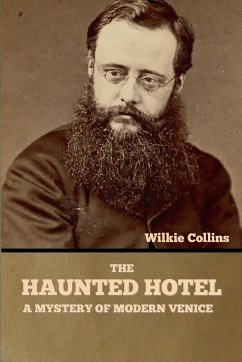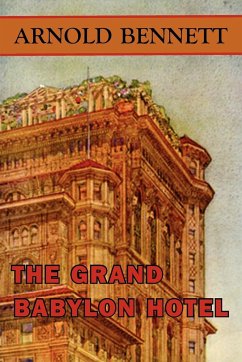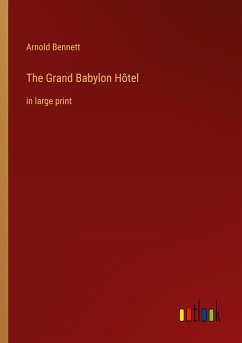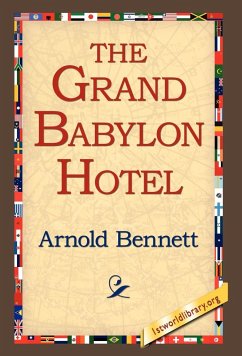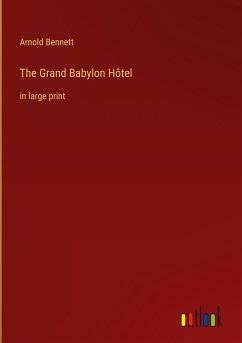
The Grand Babylon Hotel
Versandkostenfrei!
Versandfertig in 1-2 Wochen
17,99 €
inkl. MwSt.

PAYBACK Punkte
9 °P sammeln!
The Grand Babylon Hotel is a novel by Arnold Bennett, published in January 1902, about the mysterious disappearance of a German prince. It originally appeared as a serial in the Golden Penny. The titular Grand Babylon was modelled on the Savoy Hotel which Bennett had much later also used as a model for his 1930 novel Imperial Palace. In Bennett's journal entry on 18 January 1901, he also notes that said his serial was being advertised was the "best thing of this sort" they'd seen since The Mystery of a Hansom Cab by Fergus Hume. London-based literature review periodical The Academy had an unsi...
The Grand Babylon Hotel is a novel by Arnold Bennett, published in January 1902, about the mysterious disappearance of a German prince. It originally appeared as a serial in the Golden Penny. The titular Grand Babylon was modelled on the Savoy Hotel which Bennett had much later also used as a model for his 1930 novel Imperial Palace. In Bennett's journal entry on 18 January 1901, he also notes that said his serial was being advertised was the "best thing of this sort" they'd seen since The Mystery of a Hansom Cab by Fergus Hume. London-based literature review periodical The Academy had an unsigned review that called the novel a "very amusing story of the feuilleton type". Review had also said that novel was "excellent in the mingling of farce and characterization." An unsigned review in The Times Literary Supplement notes that Grand Babylon follows a type of subgenre that Anthony Hope had begun with The Prisoner of Zenda and praised Bennett's ability to keep readers interest from the first page to the last. In 1916 the novel was adapted into a British film The Grand Babylon Hotel directed by Frank Wilson. In 1920 the title was used by the German filmmaker E.A. Dupont for his thriller The Grand Babylon Hotel. Dupont and Bennett later worked together on the 1929 film Piccadilly. Chris Harrald adapted the novel for BBC Radio 4 in 2009 in 2 parts with John Sessions as Theodore Racksole and Matti Houghton as Nella Racksole, Stephen Critchlow as Prince Eugen, Fenella Woolgar as Miss Spencer and Joe Kloska as Aribert. Xavier Mauméjean adapted Lise Capitan's French language translation for Radio France Culture (Samedi Noir programme). (wikipedia.org) About the Author: Enoch Arnold Bennett (27 May 1867 - 27 March 1931) was an English writer. He is best known as a novelist, but he also worked in other fields such as the theatre, journalism, propaganda and films. Bennett was born in a modest house in Hanley in the Potteries district of Staffordshire. Hanley was one of the Six Towns that were joined together at the beginning of the 20th century as Stoke-on-Trent and are depicted as "the Five Towns" in some of Bennett's novels. Enoch Bennett, his father, qualified as a solicitor in 1876, and the family moved to a larger house between Hanley and Burslem. Bennett was educated in Newcastle-under-Lyme. In 1889 Bennett won a literary competition run by the magazine Tit-Bits and was encouraged to take up journalism full-time. In 1894 he became assistant editor of the magazine Woman. He noticed that the material offered by a syndicate to the magazine was not very good, so he wrote a serial that was bought by the syndicate for 75 pounds (equivalent to £10,000 in 2016). He then wrote another. This became The Grand Babylon Hotel. Just over four years later his novel A Man from the North was published to critical acclaim and he became editor of the magazine. In 1900 Bennett gave up the editorship of Woman and dedicated himself to writing full-time. However, he continued to write for newspapers and magazines while finding success in his career as a novelist. In 1926, at the suggestion of Lord Beaverbrook, he began writing an influential weekly article on books for the London newspaper the Evening Standard. One of Bennett's most popular non-fiction works was the self-help book How to Live on 24 Hours a Day. His diaries have yet to be published in full, but extracts from them have often been quoted in the British press. Bennett's output was prodigious and, by his own admission, was based on maximising his income. As Bennett put it: (wikipedia.org)





